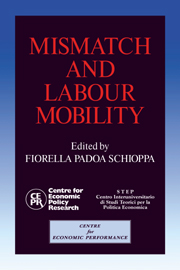Book contents
- Frontmatter
- Contents
- List of figures
- List of tables
- Preface
- Acknowledgements
- List of conference participants
- 1 A cross-country comparison of sectoral mismatch in the 1980s
- 2 Mismatch: a framework for thought
- Discussion
- 3 Match and mismatch on the German labour market
- Discussion
- 4 Mismatch in Japan
- Discussion
- 5 Mismatch and internal migration in Spain, 1962–86
- Discussion
- 6 Regional inequalities, migration and mismatch in Italy, 1960–86
- Discussion
- 7 Skill shortages and structural unemployment in Britain: a (mis)matching approach
- Discussion
- 8 Labour market tightness and the mismatch between demand and supply of less-educated young men in the United States in the 1980s
- Discussion
- 9 Skill mismatch, training systems and equilibrium unemployment: a comparative institutional analysis
- Discussion
- 10 Unemployment, vacancies and labour market programmes: Swedish evidence
- Discussion
- 11 Mismatch and labour mobility: some final remarks
- Index
Discussion
Published online by Cambridge University Press: 05 October 2010
- Frontmatter
- Contents
- List of figures
- List of tables
- Preface
- Acknowledgements
- List of conference participants
- 1 A cross-country comparison of sectoral mismatch in the 1980s
- 2 Mismatch: a framework for thought
- Discussion
- 3 Match and mismatch on the German labour market
- Discussion
- 4 Mismatch in Japan
- Discussion
- 5 Mismatch and internal migration in Spain, 1962–86
- Discussion
- 6 Regional inequalities, migration and mismatch in Italy, 1960–86
- Discussion
- 7 Skill shortages and structural unemployment in Britain: a (mis)matching approach
- Discussion
- 8 Labour market tightness and the mismatch between demand and supply of less-educated young men in the United States in the 1980s
- Discussion
- 9 Skill mismatch, training systems and equilibrium unemployment: a comparative institutional analysis
- Discussion
- 10 Unemployment, vacancies and labour market programmes: Swedish evidence
- Discussion
- 11 Mismatch and labour mobility: some final remarks
- Index
Summary
I would like to begin the discussion of the study by Charles Bean and Christopher Pissarides by congratulating the authors for a very interesting and stimulating piece of work.
I would also point out from the beginning that I will make only sporadic comments on the study, rather than discussing it systematically. The basic reason for that is that the study is a difficult one to discuss. Bean and Pissarides present a very articulate contribution. Section 1 (and partly section 2) deals (rather briefly, it must be said) with some facts and does some theorising about structural unemployment and mismatch in the United Kingdom; the core of the study (sections 3 and 4) is devoted to the presentation of a very specific model of unemployment with skill differentiation, and to its estimation and use for empirical analyses on British data; the final part (section 5) is concerned with a brief discussion of policy implications. Besides, the various pieces of evidence from the rich set of empirical analyses are not fully consistent with the proposed model; on the whole, they seem to suggest that the questions addressed by Bean and Pissarides are far from being convincingly settled, and that further research is needed to account for observed divergences in unemployment rates by skill.
- Type
- Chapter
- Information
- Mismatch and Labour Mobility , pp. 354 - 359Publisher: Cambridge University PressPrint publication year: 1991



